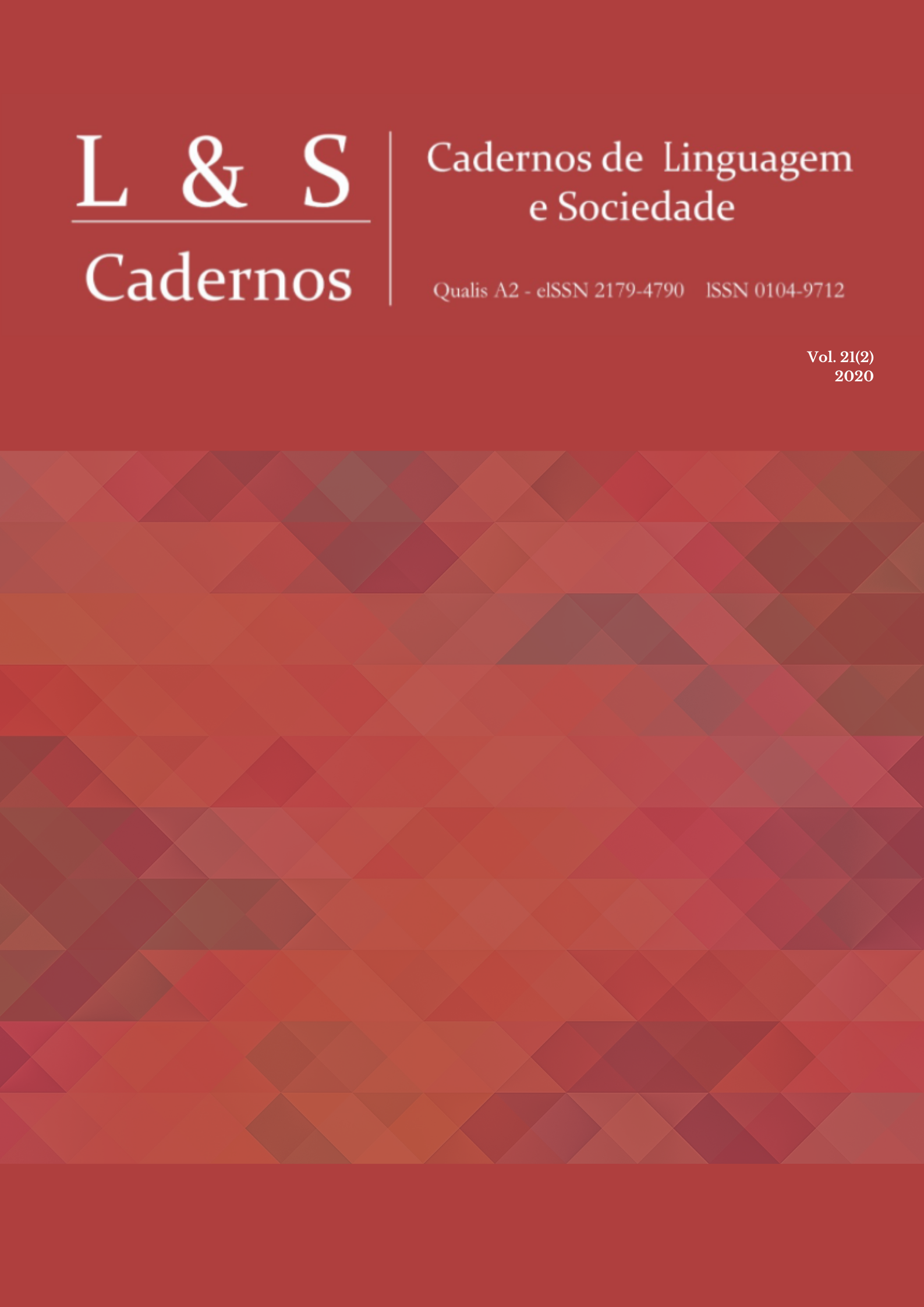Modos Queer de pesquisar e a questão racial: conjugando epistemologias feministas, interseccionalidade e decolonialidade
DOI :
https://doi.org/10.26512/les.v21i2.35198Mots-clés :
queer, interseccionalidade, decolonialidade, epistemologias feministas, branquitudeRésumé
L'objectif de cet essai est de réfléchir à la production de connaissances engagées avec des principes de justice sociale, lorsqu'il s'agit de phénomènes sociaux dans lesquels le langage en tant que sociosémiose joue un rôle fondamental. Dans ce contexte, je cherche à réfléchir sur la création universitaire qui se situe dans un paradigme intersectionnel et décolonial, nécessairement contre-hégémonique, féministe et antiraciste, qui centralise la formulation des compréhensions sur la relation micro/macro, dans des processus qui favorisent le sentiment de criticité dans la recherche comme lieu de réflexivité critique, dans le contexte de l'université comme espace institutionnel de blancheur
Téléchargements
Références
ALMEIDA, S. Racismo Estrutural. Belo Horizonte: Letramento: Justificando, 2018.
ANZALDÚA, G. Making Face / Making Soul Haciendo Caras. Creative and Critical Perspectives by Women of Color. San Francisco: Aunt Lute, 1987.
ALCOFF, L. The problem of speaking for others. Cultural Critique. no. 20 (Winter, 1991-1992), 2007.
ALCOFF, L. Mignolo’s Epistemology of Coloniality. The New Centennial Review, v. 7, n. 3, 2008.
ALCOFF, L.; POTTER, E. Feminist Epistemologies. New York / London: Routledge, 1993.
BAIRROS, L. Nossos feminismos revisitados. Revista Estudos Feministas, v. 3, n. 2, p. 458-463, 1995.
BENTO, M. A. S. Branqueamento e Branquitude no Brasil. In: CARONE, I.; BENTO, M. A. S. (org.). Psicologia social do racismo: estudos sobre branquitude e branqueamento no Brasil. Petrópolis, RJ: Vozes, 2002.
BORGES, T. R. S. Por um sentir crítico: um olhar feminista interseccional sobre a socioconstrução de identidades sociais de gênero, raça/etnia e classe de professoras de línguas (master’s thesis). Pontifical Catholic University of Rio de Janeiro, Rio de Janeiro, Brazil, 2017a.
BORGES, T. R. S. Pelo amadurecimento de um ‘sentir crítico’: entendendo a socioconstrução de identidade de uma professora negra e seus atravessamentos interseccionais. Veredas, v. 21, n. 2, p. 8-23, 2017b.
BLOMMAERT, J. Context is / as critique. Critique of Anthropology, v. 21, n. 1, p. 13”“32, 2008.
BLOMMAERT, J. Language and Superdiversity. Diversities, v. 13, n. 2, 2011.
BORBA, R. A linguagem importa? Sobre performance, performatividade e peregrinações conceituais. Cadernos Pagu, Campinas, n. 43, p. 4441-474, jul./dez. 2014.
BROWN, W. Undoing the demos. MIT Press, 2015.
BUTLER, J. Performative Acts and Gender Constitution: An Essay in Phenomenology and Feminist Theory Theatre Journal, v. 40, n. 4, p. 519-531, Dec. 1988;
BUTLER, J. Gender trouble: feminism and the subversion of identity. New York: Routledge, 1990.
BUTLER, J. Bodies that matter: on the discursive limits of 'sex'. New York: Routledge, 1993.
BUTLER, J. Excitable Speech: A politics of the performative. New York: Routledge, 1997.
BUTLER, J. Undoing Gender. New York/London: Routledge, 2004.
BUTLER, J. When gesture becomes event. Theater Performance Philosophy ”“ International Conference: Crossings and Transfers in Contemporary Anglo-American Thought. TPP2014 : Judith Butler. Disponível em: https://goo.gl/UUjwK0
CARONE, I.; BENTO, M. A. S. Psicologia Social do Racismo: Estudos sobre a branquitude e branqueamento no Brasil. Petrópolis, RJ: Editora Vozes, 2014.
CARNEIRO, S. A Construção do Outro como não-ser como fundamento do ser. Tese de Doutorado em Educação. Área da Filosofia da Educação. Universidade de São Paulo, SP, 2005.
CÉSAIRE, A. Discurso sobre o colonialismo. Lisboa: Sá da Costa, 1978.
COLLINS, P. H. Black feminist thought: knowledge, consciousness, and the politics of empowerment. New York: Routledge, 1990.
COLLINS, P. H. On Intellectual Activism. Philadelphia: Temple University Press, 2013.
COLLINS, P. H. Se perdeu na tradução? Feminismo negro, interseccionalidade e política emancipatória. Revista Parágrafo, p.6-17, 2017.
COLLINS, P.; BILGE, S. Intersectionality. Cambridge: Polity Press, 2016.
CRENSHAW, K. Demarginalizing the Intersection of Race and Sex: A Black Feminist Critique of Antidiscrimination Doctrine, Feminist Theory and Antiracist Politics. The University of Chicago Legal Forum 140, p. 139-167, 1989.
CRENSHAW, K. Mapping the Margins: Intersectionality, Identity Politics, and Violence against Women of Color. Stanford Law Review, v. 43, n. 6, p.1241-1299, 1991.
CRENSHAW, K. The urgency of intersectionality. TED Talk, 2016. Disponível: http://tiny.cc/r1zqhz
CURIEL, O. Feminismo Decolonial. Prácticas Políticas Transformadoras. Conferência, 2017. Disponível: http://tiny.cc/f2zqhz
DAVIS, A. Y. Women, race and class. New York: Vintage books, 1983.
DAVIS, A. Y. Freedom is a constant struggle.Chicago: Haymarket books, 2016.
FABRICIO, B. Linguística Aplicada como espaço de “desaprendizagem”: redescrições em curso. In: MOITA LOPES, L. P. Por uma Linguística Aplicada Indisciplinar. São Paulo: Parábola Editorial, 2006. p.45-63.
FABRICIO, B. Transcontextos educacionais: gêneros e sexualidades em trajetórias de socialização na escola. In: SILVA, D. N.; FERREIRA, D. M. M.; ALENCAR, C. N. (org.) Nova Pragmática: Modos de Fazer. São Paulo: Cortez Editora, 2014. p.145-189.
FERREIRA, A. J. Letramento racial crítico através de narrativas autobiográficas: com atividades reflexivas. Ponta Grossa: Editora Estúdio Texto, 2015.
FREIRE, P. Pedagogia da Tolerância. Rio de Janeiro/ São Paulo: Paz e Terra, 1995.
FOUCAULT, M. A ordem do discurso. São Paulo: Edições Loyola, 2014.
FOUCAULT, M. História da sexualidade: a vontade de saber. Rio de Janeiro: Paz e Terra, 2014.
FOUCAULT, M. Microfísica do Poder. Rio de Janeiro: Graal, 1979.
GAL, S. Language, gender and power: an anthropological review. In: Hall e Bucholtz (ed.). Gender articulated: socially constructed self. New York: Routledge, 1995. p.169-182.
GONZALEZ, L. Racismo e sexismo na cultura brasileira. Revista Ciências Sociais Hoje, Anpocs, p. 223-244, 1984.
HALLIDAY, M. A. K. An Introduction to Functional Grammar. Londres: Routledge, 1994.
HARAWAY, D. Situated Knowledges: The Science Question in Feminism and the Privilege of Partial Perspective. Feminist Studies, v. 14, n. 3, p. 575-599, Autumn 1988.
HARDING S. Rethinking Standpoint Epistemology: What Is“Strong Objectivity”?. In: ALCOFF, L; POTTER, E. Feminist Epistemologies. New York / London: Routledge, 1993.
hooks, b. Ain’t I a woman? London: Pluto Press, 1982.
HARDING S. Feminist Theory from margin to center. Boston: South End Press, 1984.
HARDING S. Teaching community. NY/London: Routledge, 2003.
HARDING S. All about love. NY/London: Routledge, 2010.
KILOMBA, G. “Who can speak?” Facebook Official Page, 2013. Disponível em: https://goo.gl/btTfQ9
KILOMBA, G. O racismo é uma problemática branca. Carta Capital, 2016. Disponível em: http://tiny.cc/uf0qhz
LIMA, F. Sobre dores, saudades e (re)existências. Dossiê: Raça, Interseccionalidade e Violência ”“ Corpos e processos de subjetivação em mulheres negras e lésbicas. v.04, n.02, 2018.
LORDE, A. Sister Outsider: Essays and Speeches. New York: The Crossing Press, 1984.
LYKKE, N. Feminist studies: a guide to intersectional theory, methodology and writing. Nova Iorque/ Londres: Routledge, 2010.
MBEMBE, A. A crítica da razão negra. São Paulo: N-1 edições, 2018a.
MBEMBE, A. Necropolítica. São Paulo: N-1 edições, 2018b.
MENEZES DE SOUZA, L. M. T. Para uma redefinição de letramento crítico: conflito e produção de significação. In: Maciel, R. F.; Araújo, V. A. (org.) Formação de professores de Línguas: ampliando perspectivas. Jundiaí: Paco Ed. 2011. p. 128-140.
MOITA LOPES, L. P. Por uma Linguística Aplicada Indisciplinar. São Paulo: Parábola, 2006.
MOITA LOPES, L. P. Linguística Aplicada na Modernidade recente. São Paulo: Parábola Editorial, 2013.
MOHANTY, C. T. Under Western Eyes: Feminist Scholarship and Colonial Discourses. On Humanism and the University I: The Discourse of Humanism, v. 12, n. 3 ”“ v. 13, n. 1, 1984. pp.333-358.
MILLER, I. K. Formação de Professores de línguas: da eficiência à reflexão crítica e ética. In: MOITA LOPES, L. P. (org.) Linguística Aplicada na Modernidade recente. São Paulo: Parábola, 2013. p .227-248.
MULLER, T. M. P.; CARDOSO, L. (org.). Branquitude: estudos sobre a identidade branca no Brasil. Curitiba: Appris, 2017.
PENNYCOOK, A. Critical Applied Linguistics: a critical introduction. London: Lawrence, 2001.
PENNYCOOK, A. Critical Moments in a TESOL Practicum. In: NORTON, B.; TOOHEY, K. (ed.). Critical Pedagogies and Language Learning. Cambridge University Press, 2004. p.327-346.
SOUSA SANTOS, B. MENESES, M. P. (org.). Epistemologias do Sul. São Paulo: Cortez, 2010.
SILVERSTEIN, M. Indexical Order and the Dialectics of Sociolinguistics. Language and Communication, n. 23, p.193-229, 2003.
SILVERSTEIN, M. Pragmatic Indexing M Silverstein, The University of Chicago: Elsevier Ltd, 2006.
WALSH, C. Interculturalidad, Estado, Sociedad: luchas (de)coloniales de nuestra época. Quito: Universidad Andina Simón Bolívar, Ediciones Abya-Yala, 2009.
Téléchargements
Publié
Numéro
Rubrique
Licence
© Cadernos de Linguagem e Sociedade do Programa de Pós-Graduação em Linguística da UnB é licenciado sob uma Licença Creative Commons Atribuição-Uso não-comercial-Vedada a criação de obras derivadas 3.0 Unported. 2020

Cette œuvre est sous licence Creative Commons Attribution 4.0 International.
Autores/as que publicam nesta revista concordam com os seguintes termos:
Autores/as mantêm os direitos autorais e concedem à revista o direito de primeira publicação, sendo o trabalho simultaneamente licenciado sob a Creative Commons Attribution 4.0 International license que permite o compartilhamento do trabalho com reconhecimento da autoria do trabalho e publicação inicial nesta revista.



